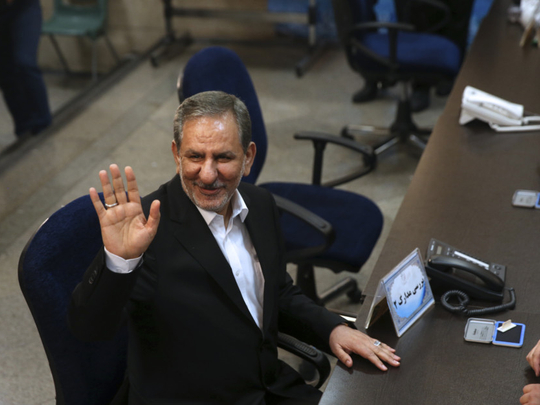
Tehran: A candidate who entered the Iranian election race to help his boss, President Hassan Rouhani, is emerging as a favourite of reformists for his bold and outspoken campaign, even though he is ultimately expected to step aside.
Eshaq Jahangiri, the first vice-president, made clear when he registered as a candidate for the top job that he was “supplementing” and not challenging the incumbent — indicating his campaign was a tactical move aimed at defending Rouhani’s achievements.
The presidential election on 19 May is the first since the 2015 nuclear deal with the west, when Tehran rolled back its nuclear programme in exchange for the removal of sanctions.
None of the candidates have spoken of scrapping that accord but two conservatives — Tehran’s mayor, Mohammad Bagher Ghalibaf, and the hardliner Ebrahim Raisi — have questioned whether Rouhani has achieved tangible economic benefits.
Jahangiri’s strong appearance in the first of three televised debates boosted the reformists but Ghalibaf said it was a “strange phenomenon” that he was running alongside Rouhani.
Referring to the marginalisation of reformists after the 2009 disputed presidential vote, which gave hardliner Mahmoud Ahmadinejad a second term in office, Jahangiri responded: “There’s a movement called the reformist movement and you’ve deprived them of all rights and now you are saying that they shouldn’t even have a candidate?
“I’ve put myself up as a representative of the reformist movement to speak out ... They confined everyone to their houses. They [Ahmadinejad’s government] earned $700 billion, they took it, they spent it and they left nothing, just unemployment.” Jahangiri has tried to portray Ghalibaf as a continuation of Ahmadinejad, condemning his “military” mindset.
On Tuesday night during a nationally televised address, an opportunity given to all candidates, he said: “People have not forgotten those days, people have to be careful and not forget the history. People should be vigilant. The history should not repeat itself in this way.”
Hussain Rassam, a political analyst, said: “Something particular about Jahangiri is that even if he is outperforming Rouhani, still at the end of the day it’s all attributed to Rouhani. It all goes to Rouhani. At the end of the day, he’s not challenging Rouhani, he’s come to Rouhani’s support.”
Jahangiri’s role is particularly important because of his influence among reformists. He is a close ally of the former president Mohammad Khatami, who endorsed Rouhani on Tuesday.
Khatami still has a huge influence despite falling foul of the establishment over the 2009 disputed elections. In 2013 his backing and that of Ayatollah Hashemi Rafsanjani were crucial in Rouhani’s victory. Last year, reformist-backed candidates supported by Khatami enjoyed a clean sweep of all 30 seats allocated to Tehran in the parliamentary elections.
Speaking to a group of reformists on Tuesday, Khatami said: “Our candidate is Rouhani. The continuation of Rouhani’s government is in the best interests of the country ... Rouhani’s failure would mean a return to the difficult years [of international sanctions and isolation].”
A number of former political prisoners have also thrown their weight behind Rouhani, including Bahareh Hedayat, who was released in September from prison after nearly seven years. Rassam said an electorate mainly concerned about the country’s economy no longer solely looked at political affiliation, and Jahangiri had impressed many voters.
He said Ghalibaf appeared to be the main challenger to Rouhani and that Raisi was likely to drop out if he continued presenting himself as “the sympathetic type” and not a someone who can “go and do the job”. “It’s definitely a tough ride for Rouhani.
Ghalibaf’s chances of having bigger vote than last time are considerable, and for Rouhani it’s not that straightforward. He has a big battle in front of him to fight.” Ghalibaf received six million votes in 2013, compared with Rouhani’s 18.6 million. Rassam added: “Rouhani has lost votes and there are people who are not very happy with his performance, not because his performance has not been good, it’s because he made a mistake: to get the nuclear deal he increased people’s expectations substantially, not realising afterwards that he would also have to deliver on those hopes.”












